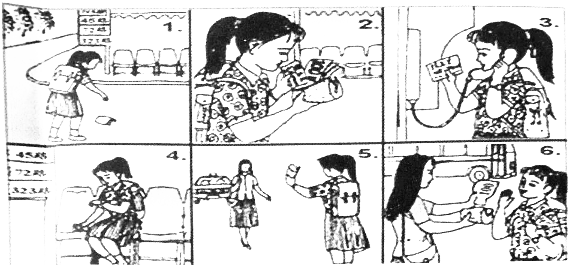题目内容
13.Martin was returning to work in his London office after spending two weeks with his brother in New York.He was coming back with a heavy heart.It was not just that it was the end of a wonderful holiday; it was not just that he invariably suffered badly from jet lag(时差); it was that Monday mornings always began with a team meeting and,over the months,he had grown to hate them.Martin was aware that colleagues approached these meetings with hidden agenda(会议议程); they indulged in (沉溺于)game playing; and he knew that people were not being honest and open.The meetings themselves were bad enough-there was all the moaning afterwards at the meeting like"I could have improved on that idea,but I wasn't going to say".
As this morning's meeting began,Martin prepared himself for the usual dullness and boredom.But,as the meeting progressed,he became aware of a strange background noise.At first,he thought that he was still hearing the engine noise from the aircraft that had brought him back to London.But,as he concentrated on the noise,it became a little clearer.
He realized,to his amazement,that he could actually hear what they were thinking at the same time as they were speaking.What surprised him,even more than the acquisition(获得)of this strange power,was that he discovered that what people were saying was not really what they were thinking.They were not making clear their reservations.They were not supporting views which they thought might be popular.They were not contributing their new insights.They were not volunteering their new ideas.
Martin found it impossible not to respond to his new knowledge.So he started to make gentle interventions,based more on what he could hear his colleagues thinking than on what he could hear them saying."So,John,are you really saying…""Susan,do you really think that?""Tom,have you got an idea on how we could take this forward?"They looked at him,puzzled.In truth,he felt rather proud of his newly-acquired talent.
As the meeting progressed,it was clear to him that each member of the meeting was learning how to hear the thoughts of the others.The game playing started to fall away; people started to speak more directly; views became better understood; the atmosphere became more open and trusting.
The meeting ended.As people left the room,Martin found that he could still hear what they were thinking."That was the best meeting we've ever had.""All meetings should be like that.""In future,I'm going to say what I think".
41.It is known from the first paragraph that MartinC.
A.just came back from his business trip in New York
B.was found to suffer from a serious heart disease during the trip
C.had a good time during his fortnight's stay in New York
D.didn't like his work in his London office
42.Why did Martin hate his company's team meeting?D
A.Because it had to be held every Monday morning.
B.Because he was tired of hosting such a meeting.
C.Because he couldn't control the meeting that was out of order.
D.Because the meeting atmosphere wasn't open and trusting.
43.The underlined part"his newly-acquired talent"in Paragraph 5means that he couldD.
A.still hear the engine noise of the plane though he was back
B.clearly hear what the members of the meeting were saying
C.actually control the thoughts of the members of the meeting
D.express what the meeting members were thinking based on their words and their thoughts
44.What do we know about this Monday morning's meeting from the passage?C
A.Martin made people say what they were thinking immediately the meeting began.
B.Martin was angry at the dullness of the meeting at the beginning of the meeting all the time.
C.Martin led people to express their real thoughts with the meeting progressing.
D.Many members of the meeting played games and told lies at the meeting all the time.
45.It is inferred from the last two paragraphs that towards the end of the meeting Martin would hear such words as"B".
A.I was thinking of making a suggestion-but I couldn't be bothered
B.I have got an idea on how we could take this forward.I think we should…
C.The usual people say the usual things,so I have no other new ideas
D.I could have improved on that idea,but I wasn't going to say.
分析 马丁旅行回来,但是心情很沉重,因为周一上午有让他觉得讨厌的团队会议.马丁意识到他的同事来参加这个会议并没有投入其中,各怀目的.会议本身就很糟糕;会议之后各种抱怨.这天早晨马丁做好了开会无聊的准备;但是让他惊奇的是他拥有了一种特殊的能力,能够听懂别人内心真正的想法,并且发现他们的想法与讲出来的不一致;于是他引导他们把各自的真正想法表述出来;结果大家觉得这是一次非常令人满意的会议,大家都决定以后就这样怎么想就怎么说.
解答 41.C.本题是细节题.根据文章第一段中"…two weeks with his brother in New York"和"It was not just that it was the end of a wonderful holiday;"可以判断答案是C.two weeks的意思是"fortnight",表示"两周".
42.D. 该题是推理判断题.根据文章第二段"he knew that people were not being honest and open."可知这是会议让马丁讨厌的原因;此外,文章倒数第二段"the atmosphere became more open and trusting."说明(会议让人厌烦)问题得到解决,会议成功;由此推断本题答案是D.
43.D.该题是推断题.根据文章第二段"He realized,to his amazement,that he could actually hear what they were thinking at the same time as they were speaking"和第三段"So he started to make gentle interventions,based more on what he could hear his colleagues thinking than on what he could hear them saying.""推断,马丁拥有了"听见别人思想的能力"并且运用这个能力来"引导他们准确表达他们真正的想法".所以答案是D.
44.C.该题是推断题,根据第三段"So,John,are you really saying…""Susan,do you really think that?""Tom,have you got an idea on how we could take this forward?"They looked at him,puzzled."可知马丁利用自己的特殊的能力引导这些参与会议的成员准确地表达他们的想法.
45.B.该题是推断题.由最后两段,特别是"the atmosphere became more open and trusting."可知与会成员畅所欲言,不再对自己的想法有时隐瞒.因此该题答案选择B.
点评 文章是马丁如何解决会议让人厌烦,引导同僚在会议上畅所欲言.题目涉及多题推理判断题.对这种题目必须在材料中具体信息的基础上做出合理的推断.所以推断必须有依据,不能凭空想象.

 小学教材完全解读系列答案
小学教材完全解读系列答案---I've just had my hair cut.What's more,I'm wearing new glasses.( )
| A. | didn't recognize | B. | didn't know | ||
| C. | hadn't known | D. | haven't recognized |
-______?Haven't you agreed?( )
| A. | How is it | B. | What is it | ||
| C. | Why don't you | D. | What do you think |
